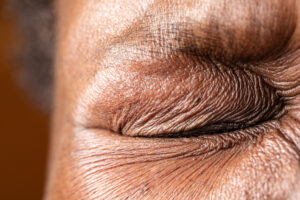June 15, 2021 | Black & Kletz Allergy

The most common location for angioedema to occur tends to be on the face, particularly of the eyelids or lips. The hands and feet are less commonly affected, but are not uncommon. Swelling of the gastrointestinal and respiratory tracts also occur, but in general, are a rare occurrence. It is important to realize that swelling of the throat can be life-threatening and those individuals who experience throat tightening should be prescribed a self-injectable epinephrine device such as an EpiPen, Auvi-Q, or Adrenaclick. Patients should be told that if they use their device, they should immediately go to the closest emergency room.
Angioedema occurs because there is a leakage of fluid through small blood vessel walls which in turn causes soft tissue swelling.
The causes of angioedema can be classified into 4 basic groups: allergic, non-allergic drug reaction, hereditary, and idiopathic.
Allergic causes of angioedema may include drug allergies [e.g., penicillin, sulfa, vaccines, aspirin, nonsteroidal anti-inflammatory drugs (NSAIDs)], food allergies (e.g., peanuts, tree nuts, shellfish, fish, milk, eggs), insect venom allergies (e.g., honey bees, wasps, yellow jackets, hornets, fire ants), and latex allergy (e.g., gloves, condoms, catheters, balloons, dental dams).
The non-allergic drug reactions may include medications from the following classes of medications: ACE inhibitors (e.g., Enalapril, Lisinopril, Ramipril), angiotensin II receptor antagonists (e.g., losartan, candesartan, olmesartan, valsartan), proton pump inhibitors (e.g., sertraline, citalopram, fluoxetine, escitalopram, paroxetine), selective serotonin reuptake inhibitors (SSRIs) (e.g., omeprazole, pantoprazole, lansoprazole, esomeprazole), and statins (e.g., atorvastatin, pravastatin, simvastatin, rosuvastatin).
Hereditary angioedema is caused by an inherited abnormal gene that causes a deficiency of a normal protein called C1 esterase inhibitor. This deficiency leads to recurrent swelling episodes which usually begin after puberty. These swelling episodes are not associated with hives and can either be spontaneous or triggered by infection, alcohol, hormonal changes, physical stress, or mental stress.
Idiopathic angioedema is just a fancy way of saying that we do not know the underlying cause of the swellings. Autoimmune disorders (e.g., rheumatoid arthritis, systemic lupus erythematosus, Sjögren’s syndrome) may play a role however.
The diagnosis of angioedema may require blood work and/or skin testing depending on the history and physical that is obtained from the patient. The history is very important and may provide clues to the origin and source of the angioedema. If the angioedema is recurrent and has re-occurred for more than 6 weeks, blood work is usually ordered in order to rule out an underlying condition that may be the cause of the swelling episodes. Allergy skin tests may be done in order to rule out food, insect venom, latex, or medication allergies.
The treatment of angioedema depends on the severity and chronicity of the swelling episodes. In mild acute angioedema, epinephrine injection into the muscle can be performed along with intramuscular injection of an antihistamine and/or a corticosteroid. An alternative would be oral administration of an antihistamine and/or corticosteroid. Severe acute angioedema is treated similarly, however, keeping the airway open is the main goal. For that reason, the use of intramuscular epinephrine is often utilized, particularly if the swelling occurs in the throat or respiratory tract. The treatment of chronic recurrent angioedema may involve the use of oral antihistamines, H2-blockers, leukotriene antagonists, and/or corticosteroids. The treatment of hereditary angioedema involves the use of intravenous C1 inhibitor concentrate. It can also be infused prophylactically about 1 hour before a surgical procedure in order to prevent swellings. Newer medicines such as Firazyr (icatibant) and Kalbitor (ecallantide) may also be used to treat this genetic condition.
The board certified allergy doctors at Black & Kletz Allergy have been diagnosing and treating angioedema for more than 50 years. We treat both pediatric and adult patients. Black & Kletz Allergy has offices in Washington, DC, McLean, VA (Tysons Corner, VA), and Manassas, VA. All 3 of our office locations have on-site parking. For further convenience, our Washington, DC and McLean, VA offices are Metro accessible. In addition, our McLean office offers a complementary shuttle that runs between our office and the Spring Hill metro station on the silver line. For an appointment, please call our office or alternatively, you can click Request an Appointment and we will respond within 24 hours by the next business day. If you suffer from swelling episodes, hives, generalized itching, and/or any other allergy, we are here to help alleviate or hopefully end your undesirable symptoms. Black & Kletz Allergy is dedicated to providing the highest quality allergy care in a relaxed, caring, and professional environment.












